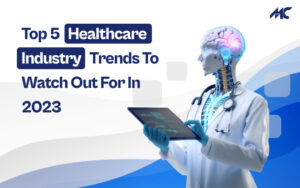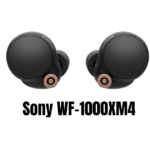
Healthcare, like many industries, is experiencing rapid change, as evidenced by the COVID-19 pandemic and recession-driven changes. Digitization has increased due to COVID-19 pandemic outbreak, leading to major transformation of the health care landscape. Healthcare app development company have played an essential role in helping medical professionals manage these obstacles effectively.
Emerging medical technologies, such as IoT AI, artificial intelligence and blockchain have unlocked new potential in healthcare. These cutting-edge tools help both patients and doctors access medical histories faster while simultaneously aiding diagnosis and overall treatment for patients.
Overall, healthcare app developers have helped make healthcare services easier to access and more effective through numerous innovations enabled by modern technologies and trends in healthcare.
2023 Will Be Filled With 5 Key Healthcare Technology Trends
1. Artificial Intelligence
Artificial Intelligence (AI) could revolutionize health care as soon as 2023 or later. AI-powered technologies, including predictive analytics and machine learning for natural language processing predictive analytics as well as other AI technologies are used to analyze vast amounts of medical data and provide details that were once difficult to obtain. AI takes Forward Mobile App Development in Healthcare and other industries as well.
AI will become increasingly important in healthcare over time by helping diagnose and treat patient outcomes while simultaneously lowering costs. Chatbots powered by AI could offer patients 24/7 help and guidance regarding their medical condition or assistance, eliminating the need to schedule physical appointments.
AI can also assist healthcare doctors in identifying patients likely to develop potentially harmful conditions and intervene early. By using AI hospitals can increase quality care while decreasing costs and improving efficiency overall.
2. Internet of Things
IoT will become an indispensable technology in healthcare by 2023. It will bring numerous advantages for patients and medical specialists. Here are three key IoT Benefits that could enhance healthcare technologies:
Better Patient Monitoring: Thanks to IoT technology, medical professionals are now able to remotely monitor vital signs such as blood pressure, heart rate and sugar levels in real time – enabling physicians to detect potential health problems before they become serious and provide prompt treatments with improved results for their patients.
Improved Efficiency: IoT Technology can streamline healthcare operations, leading to greater effectiveness and lower costs. RFID tags on medical equipment help healthcare professionals monitor inventory levels while decreasing waste. Wearable devices equipped with IoT enable healthcare staff members to track patients and staff.
Individualized Healthcare: IoT will enable healthcare professionals to customize care based on patients’ medical information, using data gleaned from multiple sources such as wearables, medical equipment or electronic health records. By analyzing this information and creating plans tailored specifically for individual demands based on this technology.
3. AR/VR
Augmented Real (AR) and Virtual Reality (VR) technologies have gained great traction within healthcare, and will likely experience exponential growth by 2023. Simulated healthcare procedures offer healthcare professionals a way to mimic medical procedures while medical school students gain experiences before treating actual patients.
AR/VR can also provide an effective means of treating discomfort by transporting patients away from their physical pain into an immersive virtual world. Furthermore, this form of technology may aid rehabilitation processes after injuries or surgeries have taken place by providing patients an escape. As AR/VR technology improves and becomes more advanced, its applications in healthcare should increase, leading to better patient outcomes and enhanced efficiency of health care delivery.
4. Voice Search
As more devices with speaking technology such as digital assistants, smart speakers and virtual assistants become popular, voice searches will soon transform health care by 2023. Patients can utilise the search function to locate health care professionals and schedule appointments, access medical records and gain information regarding their medical conditions.
Technology can also assist physicians with quickly and accurately accessing patient medical information and records to enhance diagnosis and treatment strategies, increasing patient satisfaction while offering more tailored, personalized care, ultimately leading to improvements in health care quality.
5. Chatbot
Chatbots have quickly gained prominence within medicine as they enable more effective and productive interactions between healthcare professionals and patients. Below are a few key benefits associated with chatbots as part of medical technology developments in 2023:
- Chatbots provide round-the-clock accessibility, enabling clients to connect with medical professionals whenever needed.
- Chatbots Provide Engaging Experience for Patients Chatbots provide patients with an engaging and personal healthcare journey experience, encouraging them to become more invested in their healthcare journey.
- Reduced Wait Times | Chatbots can quickly respond to patient inquiries, shortening wait times for patients while freeing health professionals to focus on more pressing matters.
- Chatbots have proven cost-effective for healthcare providers by eliminating the need for human resources to address even basic patient queries.
- Efficiency Increased: Chatbots can make administrative tasks such as appointment scheduling easier, freeing medical professionals up to focus on meeting more complex patient requirements.
- Improved accessibility: Chatbots make healthcare more available for people living in rural and less well-served areas by being available anywhere that has Internet connectivity.
- Chatbots gather data: They can gather crucial information regarding patient interactions, which can then be utilized to analyze patterns and improve treatment of patients.
Healthcare Chatbots to Improve Outcomes Chatbots can assist patients living with chronic illnesses by reminding them to take medications as well as offering support and assistance during times of distress, improving overall performance in terms of overall health. You can contact a Chatbot Development Company to get all the benefits from Chatbots in healthcare.
Conclusion
The healthcare industry is rapidly evolving, and cutting-edge technologies play a vital role in shaping how healthcare services are provided. Looking ahead towards 2023, new healthcare technology advancements will have an even more profound effect on this sector of industry.
From AI-powered health assistants to the use of VR/AR for medical education, advances in healthcare technology have revolutionized patient access, efficiency and cost effectiveness of services provided. Telemedicine’s growing use and digital health technologies allow healthcare providers to connect with patients living remotely while improving the quality of healthcare provided.
These 5 most promising technological advancements for healthcare in 2023 offer us an insight into its future and show we can expect continued progress and development within this field. Therefore, it is critical that health professionals remain up-to-date and adaptable so as to provide patients with effective healthcare in 2023 and beyond.






Leave a Reply